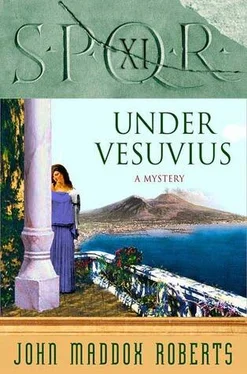John Roberts - Under Vesuvius
Здесь есть возможность читать онлайн «John Roberts - Under Vesuvius» весь текст электронной книги совершенно бесплатно (целиком полную версию без сокращений). В некоторых случаях можно слушать аудио, скачать через торрент в формате fb2 и присутствует краткое содержание. Жанр: Исторический детектив, на английском языке. Описание произведения, (предисловие) а так же отзывы посетителей доступны на портале библиотеки ЛибКат.
- Название:Under Vesuvius
- Автор:
- Жанр:
- Год:неизвестен
- ISBN:нет данных
- Рейтинг книги:3 / 5. Голосов: 1
-
Избранное:Добавить в избранное
- Отзывы:
-
Ваша оценка:
- 60
- 1
- 2
- 3
- 4
- 5
Under Vesuvius: краткое содержание, описание и аннотация
Предлагаем к чтению аннотацию, описание, краткое содержание или предисловие (зависит от того, что написал сам автор книги «Under Vesuvius»). Если вы не нашли необходимую информацию о книге — напишите в комментариях, мы постараемся отыскать её.
Under Vesuvius — читать онлайн бесплатно полную книгу (весь текст) целиком
Ниже представлен текст книги, разбитый по страницам. Система сохранения места последней прочитанной страницы, позволяет с удобством читать онлайн бесплатно книгу «Under Vesuvius», без необходимости каждый раз заново искать на чём Вы остановились. Поставьте закладку, и сможете в любой момент перейти на страницу, на которой закончили чтение.
Интервал:
Закладка:
The relief that rolled off the man was all but palpable. The crowd applauded and declared that this was a sterling example of Roman justice at its best. The truth was, homicide was not regarded as a particularly serious crime, as long as poison or magic were not involved, and a killing in a fair fight hardly qualified as murder at all. It was this man's misfortune that the dead man was a citizen and he was not. No doubt he was already plotting his escape.
I declared the court adjourned and was looking forward to a pleasant afternoon of eating, bathing, and socializing when I noticed a striking man who had stood among the onlookers and now wore an expression of disappointment. He was very tall, with a dark, hawk-featured face and dense, square-cut black beard. He was dressed in a long robe of splendid material, worked with a great deal of gold thread. I sent a lictor to summon him.
He approached, smiling. "Praetor, your notice does me honor." He glanced toward the local officials who, noses high, affected not to notice him and added wryly, "More honor than some think I deserve."
"That's all right. I'm the one with imperium here, so I can do as I like. You're Gaeto the Numidian, I presume?"
"I am he."
"I met your son recently. The resemblance is not difficult to spot. Do you attend courts often?"
"At every opportunity. I like to get the first look at those who are condemned to slavery. If you had not given that man to the city, I would have bid on him."
"I would think your business would be depressed of late, with all the Gallic captives flooding Italy."
"Most of them are unskilled and useful only for farm labor gangs. I buy for quality, not quantity. And expert seaman are in high demand."
"How would a captain prevent a slave sailor from escaping?" I asked him.
"Where would such a one go? The sea is a Roman lake. To sail beyond the Pillars of Hercules or to the eastern end of the Pontus Euxinus means living among savages. No, he would stay on his ship and follow his calling. After all, the work would be the same, the food the same, the dangers and the obedience to his captain the same as when he was free. Only the pay would be different, and what sensible man would trade living in civilization for life among barbarians over a handful of denarii?"
"When you put it that way, it makes sense," I admitted. Then I remembered why I had summoned him. "Gaeto, I realize that this does not come under my official purview, but I fear that your son may be heading for trouble."
The man frowned, a formidable expression on his powerful face. "Trouble, how so? If he has offended you in any way, I shall thrash him immediately."
"Nothing like that," I assured him. "But there seems to be something going on between the boy and the daughter of Apollo's priest on the estate I am inheri-where I now reside."
The frown was replaced with a smile. "Carefree, affluent young men pay court to beautiful young women. What could be more natural?"
"Naturalness does not come into it. You are a foreigner here and the people of this district are citizens, even the Greeks and Samnites among them. The priest is an aristocrat of ancient family, while your profession is, shall we say, held in low esteem. Your son could find himself the target of resentment. People would dredge up old stories about Jugurtha and the Numidian war and, next thing you know, a mob of local drunks would set fire to your house and stone you to death when you came running out with your clothes on fire and that would be a pity because, as the man on the scene with imperium, I am empowered to call in soldiers to put down civil unrest and I would indeed do so and then / would be the one everyone would hate and them my family would be very unhappy with me for alienating a whole pack of voters." I said that last sentence in a single breath, a tribute to my oratorical training.
His smile turned grim. ''I see. I will talk to my son about this." Then he brightened. "In three days, Baiae will give a banquet in your honor. I will be there."
"I look forward to it."
"I think you may find it an illuminating experience."
And with that enigmatic utterance, he took his leave gracefully.
I think I can say without reservation that Baiae is the most beautiful place in Italy. It is situated on a jewellike little bay about eight miles from Cumae and about an equal distance from my new (and, I hoped, soon to be permanent) abode. It had been a part of Cumaean territory when that city was independent and served as its port. Because of its superb setting, salubrious climate, and hot springs, it had for centuries been a favorite spot for the great and wealthy to build their villas and it was the favorite resort for Romans during the hot months.
Also, its reputation for luxury and immorality were legendary, and that was the part that appealed to me. Since the destruction of Sybaris, Baiae has reigned supreme as the home of libertines, rakes, and voluptuaries. Its scandalous life goes on day and night, made possible by that marvel unknown in Rome, effective street lighting. Lamps, cressets, and torches are kept alight during the dark hours by a crew of diligent public slaves. Cato, upon seeing Baiae thus illuminated, was scandalized. "People should sleep at night!" he cried.
A town more different from Rome is hard to imagine. Its streets are broad and never steep. Lest the populace be troubled by the scorching sun, all the streets and plazas are covered by awnings of costly cloth. The streets themselves are paved with colorful tiles, swept and scoured clean by another gang of slaves. All the streets are lined with planting boxes and giant vases carved from tufa in which grow flowers and fragrant bushes in incredible profusion, so that the air always smells sweet, no matter which way the wind is blowing. Fine trees grow before the spacious porticos. There are many tiny parks and gardens scattered throughout the town, where exotic songbirds sing in cages hung from all the trees. Should the birds tire the ear, each park has its own consort of musicians and singers, also owned by the town.
The boating parties of Baiae are legendary, and the bay's wharfs are lined with pleasure craft, from small gondolas suitable for four or five inebriated carousers to covered barges that would carry several hundred guests. For really splendid occasions, a great number of these barges could be yoked together in the center of the bay with the whole free population of the town aboard, along with enough slaves to keep them entertained.
Baiae has no penniless rabble like Rome's. The greater part of the permanent population are equites, and even the shopkeepers enjoy a property assessment only slightly lower. Even the slaves are the envy of slaves in other parts of Italy. The very street cleaners live in barracks much finer than the tenements of Rome's free poor.
Cato's final word on Baiae was characteristic: "What a waste of fine farmland." That alone was enough to make me fall in love with the place.
The delegation that greeted us when we were within a mile of the city was decked out in snowy togas, flower chaplets, and the insignia of many offices and priesthoods. Images of the gods were borne on litters, and musicians tootled while temple slaves in white tunics swung elaborate golden censers on chains, perfuming the air with fragrant smoke. A civic chorus (that old Greek specialty) sang songs of welcome.
"Not bad for a man who never even conquered a single nation of barbarians," I said with some satisfaction. "I wonder if every praetor gets this treatment or just the ones married*to a Caesar."
"I'm sure your own dignity is quite impressive enough, dear," Julia said.
We were carried in her elaborate litter, rather crowded now, what with Circe and Antonia making a pair of sweet-smelling cushions behind us. I had wanted to ride, but Julia had vetoed that. It is all but impossible to wear a toga on horseback, and Julia declared that I must enter the town in my purple-bordered toga praetexta. An old-fashioned Roman would have walked, but there were limits to my respect for tradition.
Читать дальшеИнтервал:
Закладка:
Похожие книги на «Under Vesuvius»
Представляем Вашему вниманию похожие книги на «Under Vesuvius» списком для выбора. Мы отобрали схожую по названию и смыслу литературу в надежде предоставить читателям больше вариантов отыскать новые, интересные, ещё непрочитанные произведения.
Обсуждение, отзывы о книге «Under Vesuvius» и просто собственные мнения читателей. Оставьте ваши комментарии, напишите, что Вы думаете о произведении, его смысле или главных героях. Укажите что конкретно понравилось, а что нет, и почему Вы так считаете.









